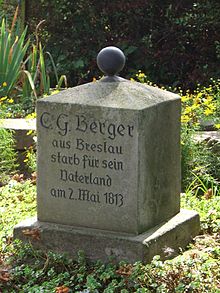Christian Gottlieb Berger (soldier)
Christian Gottlieb Berger (born January 30, 1787 in Breslau ; † May 2, 1813 in Rahna ) was a volunteer in the Wars of Liberation in 1813. He fell in the battle of Großgörschen .
Life
Christian Gottlieb Berger came from a wealthy family in Breslau. Even as a child he showed a keen interest in nature.
In 1805 he began to study law in Halle (Saale) . One of his first trips from Halle took him to Weimar , where he met Goethe .
After completing his studies, he made long trips to several European countries. On these trips he made the decision to devote himself entirely to natural history. Mineralogy and botany were his favorite studies on the travels.
His path led him first from Heidelberg along the Rhine to Holland , then he traveled through France for two years before going to Switzerland and later to Italy ( Naples , Messina ). After returning to Wroclaw, he began to organize his rich collections.
On February 3, 1813 issued Prussian king , who was to protect against access by French military in Wroclaw, on the advice of Scharnhorst's a call for the formation of a voluntary hunter - detachments . The first meeting point for these departments was Breslau. The 26-year-old Berger also joined the hunter detachment of the Guard Hunters .
In the Battle of Großgörschen, the first of the Wars of Liberation, he was hit in the forehead by a bullet in the village of Rahna on May 2, 1813. In Rahna there is not only a garden but also his grave , which was redesigned in 1989.
A street in Rahna was named after him.
Individual evidence
- ↑ a b Goethe yearbook . Published by Ludwig Geiger. Tenth volume. (With the fourth annual report of the Goethe Society. Frankfurt a. M.), Literarisches Anstalt Rütten & Loening 1889. pp. 76–77
- ^ German Historical Museum, letter from Ludwig Hauschild
- ^ Page of the Scharnhorst Committee
| personal data | |
|---|---|
| SURNAME | Berger, Christian Gottlieb |
| BRIEF DESCRIPTION | German volunteer of the Wars of Liberation |
| DATE OF BIRTH | January 30, 1787 |
| PLACE OF BIRTH | Wroclaw |
| DATE OF DEATH | May 2, 1813 |
| Place of death | Rahna |
